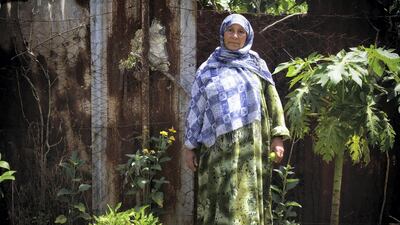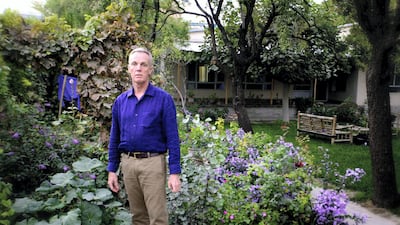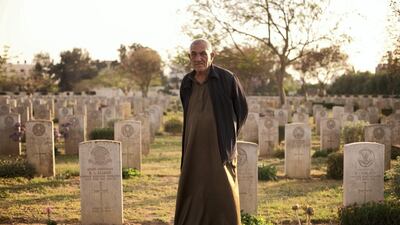When Lalage Snow first arrived in Afghanistan's Helmand Province in 2010, then in the grips of a vicious battle between the Taliban and UK troops, the British war photographer stumbled across a story far removed from the carnage. Not that she knew it at the time, however. Her first meeting with the Afghan army base captain, General Shirin Shah, was supposed to be merely introductory, but the veteran soldier had other plans.
“You British love your gardens and so do we,” he exclaimed via a translator, before leading Snow to the back of the barracks and into a small outdoor nursery. She found a tight patch of soil which was home to a dazzling display of flora, with red geraniums and orange dahlias intermingling with scarlet and yellow roses.
Snow retells this tale in her affecting book, War Gardens: A Journey through Conflict in Search of Calm. In unhurried yet clear-eyed prose, she recalls how that meeting sowed the seeds for a project she would take on two years later – one that took her to other conflict zones, such as Palestine's West Bank and the Ukrainian city of Donetsk – in order to "understand just how vital gardens are against a horrid wilderness of war".
However, before the idea for a book began to take shape, Snow recalls how taking photographs of Afghan gardens – from the small and patchy to the more meticulous – gave her stint in the country a new sense of meaning. "As a war correspondent you can really begin to feel desensitised to your surroundings," she says.
"There were a lot of us photographers around in Afghanistan, and you take these images of maimed soldiers and starving children, and you begin to wonder what does it all mean any more? Because if the situation is not changing, something is ultimately failing. So I began to work in a counterintuitive way. Since Afghans are mad-keen gardeners, I began chatting to them about that."
A new take on an old story
That quest to seek a fresh perspective on a tired story was effective in breaking the ice – and then bread – with locals suspicious of foreign media. Tired of constant discussions of war, some Afghans were more interested in chatting about roses than rockets, Snow found.
"I was completely surprised by their enthusiasm," she says. "Before, when I approached them for interviews they would say: 'Why should I talk to you? You come here all the time and nothing changes for us. You can go back home, but we must stay here.' But when I said: 'I actually just want to talk about your plants,' they would say: 'Oh, let's do that.'"
Of course, gardening is a practice steeped in metaphor, and reflections on war were never far from the surface. It was an insight Snow gleaned on a rooftop in Gaza in May 2013. "I met this Palestinian who kept 500 plants, all kinds of cactus, on his roof," Snow says. "He used the cactus as a metaphor for the Palestinian struggle, in that you can pluck it and put it in rather dry soil and it will flourish. Interestingly, the Israelis also told me the exact same thing. It made me want to shake both of these people and say: 'See? You at least have that commonality.'"
A year later, in 2014, Mulla Issa from the Shin Kalay village Helmand, told Snow: “There is a line in the Quran from the Prophet Mohammed. He says: ‘If you want to see me, give a rose to your neighbour as a gift.’”
Meanwhile in Ukraine's industrial city of Donetsk, which Snow visited when it was seized by pro-Russian separatist forces in 2014, she discovered that gardening was viewed as the cultural fault line separating them from the country's developed cities. In a telling passage, Snow meets a seasoned green thumb, Alexander, who watered his 30-plus balcony plants every day despite the shelling around him. "It is important to make our children love gardens; it teaches them old-fashioned values to enable them to be good Ukrainians in the future," he told Snow.
Igor Norenko from the Leninsky District, told her that same year: “I made different levels of the garden for different types of plants, and find it’s more economical for watering. About 80 per cent of it is for the family to eat – the only things I don’t grow are potatoes and onions. The plant where I work is closed while this war carries on, so I’ve got more time to garden.”
Snow says the disparity of living conditions in Donetsk and Ukraine's unoccupied cities, some of which were merely an hour or two away, shocked her. "Because of the war, a lot of supermarkets and shops closed, and imports were drying up," she recalls. "So people there returned to subsistence gardening. People grew their own fruit and vegetables. And Ukrainians have a deep connection to the land, anyway, which goes back to before the fall of communism. So what was happening there was they were returning to the old ways and they were using that as a source of pride in the culture. They felt like they were true Ukrainians."
A sense of empathy
It’s these kinds of insights and anecdotes that make Snow’s book appealing to everyone from news hounds and lovers of travel literature to gardeners. It also resulted in Snow promoting her book at various events, from the Emirates Airline Festival of Literature in Dubai and literary festivals across Europe and Asia to small gardening centres in the UK.
It is in the latter, says Snow, that she is truly seeing the effect of her work. "There were people who read the book who only know about the countries based on what they hear in the news, and they don't know anything about the people," she says. "By reading about them, it challenges some of these ideas they have. What I tried to do with War Gardens is ignite a sense of empathy and make readers realise that someone from Gaza or in Afghanistan is just like us."
The book also illustrates how gardening habits can form part of a country or a city’s character. Kabul and Dubai may seem worlds apart, for instance, but Snow immediately saw a connection within the soil, so to speak. She points to how both cities sustain their gardens through flood irrigation, an ancient method of growing where water is funnelled in small trenches, which seep into the crops. “This is why Afghanistan is surprisingly green, and they have all these wonderful flowers like geraniums,” she says. “That kind of irrigation I see here in Dubai as well. It is not about watering certain parts, everything gets a spray here.”
As for the book's effect on Snow's gardening skills, she says it is a case of a work in progress. With her mother and brother being owners of proud gardens, Snow admits the family's green pedigree has not filtered down to her. "I will try to grow a grapefruit this year, though," she quips.
Instead, if there is one universal takeaway from her adventures, it’s the deep feeling of calmness that gardens can provide. “I was in Lahore for a book event not long ago and I was jet-lagged and tired, and by accident I discovered this little nursery in the hotel,” she says.
“So I just took off my shoes and walked barefoot in it, and immediately all my worries and tiredness went away. I was in a state of peace."
![Isra Ahmed’s soiless garden, Gaza, 2013: "With the help of an international organisation, I grow vegetables on the roof of our home. It is only a young garden [but] people with a high roof sometimes see this garden and try to copy it. Fish waste provides the nutrients for the plants, but the water is often very saline. We might not have land, but at least we can farm. I love to come up here with my books and study. Green is a calm colour. During the war, I was scared for my siblings; they were too innocent to witness what they did. People died in front of our very eyes. War destroys our dreams more than anything else, and our lives here in Gaza are beyond our control." Photo: Lalage Snow](https://www.thenationalnews.com/resizer/v2/PEZP33JQNMDZYF6W6IE3HM75ZE.jpg?smart=true&auth=912aa614dd4679f1124586f25b24d923bb399d5590463cc39c7314bdaf51c2a6&width=400&height=225)
![Igor Norenko, Donetsk, 2014: "I made different levels of the garden for different types of plants and find it’s more economical for watering. About 80 per cent of it is for the family to eat - the only things I don’t grow are potatoes and onions. The plant where I work is closed while this war carries on, so I’ve got more time to garden. The war is a real mess, [but] both sides have made mistakes. I never thought I’d see war in my lifetime. The city is almost empty now - even my family left when the shelling started. My wife begged me to go, but I couldn’t leave this house or this garden. I’ve lived here all my life; this is my garden and this is my home." Photo: Lalage Snow](https://www.thenationalnews.com/resizer/v2/AQR6PFR44QHTHM5P2ZRSKQS4X4.jpg?smart=true&auth=05561f3bdeb43aac415e944049427bda3e8a65117295b873a27fad00183afc08&width=400&height=225)
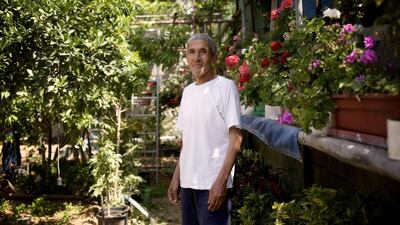
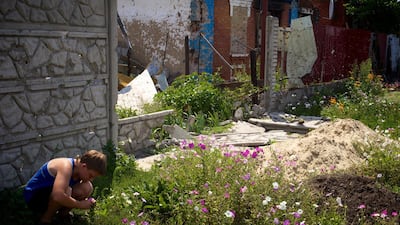
![Mohammad Abu Habsa, Kalandia Refugee Camp, West Bank, April 2016: "The garden used to be my strength. I live in this camp, but my heart and soul still belong to my village, my land on the other side of Jerusalem, to the tree under which I was born. Why should I be a refugee in my own country? What would you do if I tried to take your shoes or your blouse? You’d fight me off, wouldn’t you? I’ve seen the inside of every cell of every prison in the country. Since the death of my son, I’ve let my garden go. He is dead, [the army] will demolish my house … my garden will be destroyed; there’s no reason to bother with it at all." Photo: Lalage Snow](https://www.thenationalnews.com/resizer/v2/PHTXBYX6HKFG2JXRSGI4HUPETY.jpg?smart=true&auth=89338b5a3132b6df6a2f041e8fc038faa7332e1c4725e7b8a954cf22bde64951&width=400&height=225)
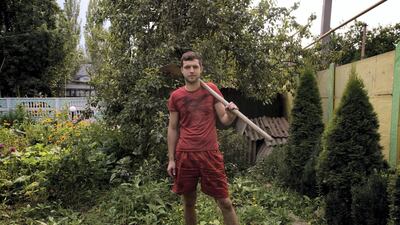

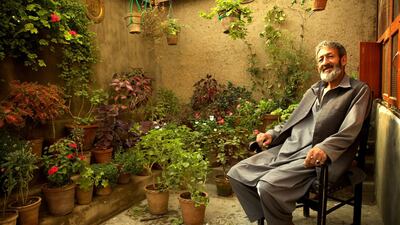

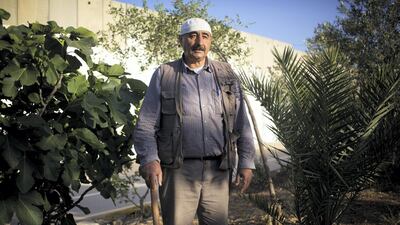
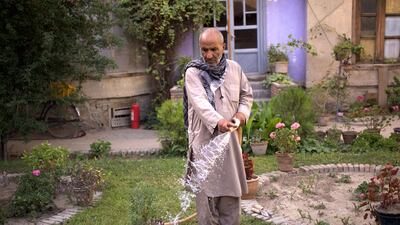
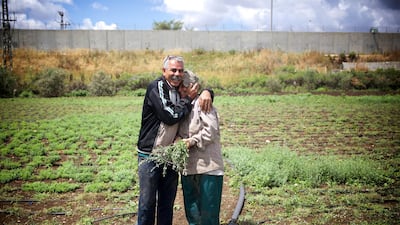

![Gulha Hazrat, FOB Lashkar Gah, Helmand, October 2013: "I’ve worked on this military base for some years now. I live in Lashkar Gah city and have always been a gardener. Why do I garden? Everyone needs green space and flowers in their life. Don’t you? And we have the best gardens in the world. The foreign soldiers based here, when they are tired or want to speak with their friends, they come here to relax after their work, and it makes me happy to see them chatting. I think they are from different countries so sometimes when the foreign soldiers [come], I will be in danger. The Taliban will probably cut my head off for working here. I don’t think my garden will survive either." Photo: Lalage Snow](https://www.thenationalnews.com/resizer/v2/QZUWL3BRYIZJWKZFFEEFYQK3ZI.jpg?smart=true&auth=a5ee50f43930a8c9efdd7ee48171ea1b2c15873c70b1f669f724693046446406&width=400&height=225)
